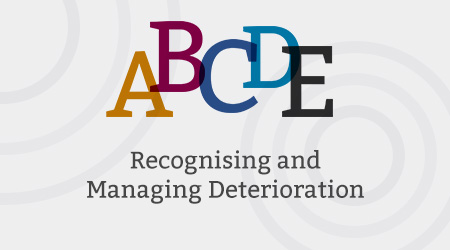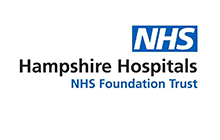Programme update
PLEASE READ: the Recognising and managing deterioration programme is being reviewed to align with updated NICE Guidance on sepsis published on 31st January 2024.
Please ensure you read the guidance and take note of the updates as you complete the training. The guidance is here https://www.nice.org.uk/guidance/NG51 and the programme is being updated as a priority.
About the recognising and managing deterioration programme
Changes to vital signs, behaviour and mental state often occur before a serious event, such as cardiac arrest. Being able to recognise and act on these changes are essential skills to improving patient safety and outcomes.
The Recognising and Managing Deterioration programme has been developed to support the workforce and organisations in ensuring staff have the necessary knowledge and skills to recognise and manage deterioration in adult patients. The programme includes resources on the National Early Warning Score (NEWS2), which is endorsed by NHS England and NHS Improvement for use in acute and ambulance settings.
Recognising and managing deterioration elearning
The recognising and managing deterioration elearning module has been developed for a wide variety of health and social care professionals working in clinical environments where adults could physically deteriorate.
This resource is structured around the ABCDE assessment tool and allows participants to revise their anatomy and physiology, develop their skills and knowledge in the assessment process to recognise deterioration and manage the findings within the scope of their clinical role.
The resource is offered at 2 levels (Universal and Advanced) to reflect the participant’s experience and clinical setting.
Resources by settings
Use the links below to find resources relevant to your setting.
Selecting the links will open a new tab in your browser and take you directly to the relevant area of the programme.
-
Primary Care
NEWS2 in Primary Care elearning
The NEWS2 in Primary Care session introduces the National Early Warning Score (NEWS) and its use in a primary care setting. It also includes:
- Evidence of NEWS and its use in the community.
- Its effective use between primary and secondary care.
- Links to other useful resources and references for further research.
The Case studies of NEWS in Primary Care session contains practical examples of when NEWS could be used and offers the primary care clinician the opportunity to consider how they might manage patients in similar situations.
-
Secondary Care
The Secondary Care training package has been developed for healthcare staff in secondary care settings and comprises two learning resources:
This resource covers:
- The need for a National Early Warning Score (NEWS2) and the evidence to support its use.
- Raising awareness and increase understanding of how the National Early Warning Score (NEWS2) is used in the recognition and response to deterioration in secondary care settings.
- Understanding the purpose of SBARD as a structured communication tool.
This resource supports the effective diagnosis and management of NEWS2 in relation to deterioration, and includes case studies on:
-
Ambulance Services
NEWS training for frontline staff
This elearning module and case studies have been developed for all frontline clinical staff by the London Ambulance Service NHS Trust.
By the end of the session, learners will be able to:
- describe the process of applying the NEWS2 tool in a clinical environment
- recognise the NEWS2 scoring system and how to apply this to a patient in a clinical environment
- demonstrate the use of the tool using the case studies provided.
- understand the thresholds, triggers, pathways and escalation to appropriate care following application of the tool.
- understand the need for system wide standardisation
NEWS training for paramedics
- The NEWS training for paramedics offers learners an overview of NEWS2 and specific case studies relevant to staff working in ambulance services.
The resource covers:
- the need for a National Early Warning Score (NEWS2) and the evidence to support its use
- raising awareness and increase understanding of how the National Early Warning Score (NEWS2) is used in the recognition and response to deterioration
- understanding the purpose of ATMISTER as a structured communication tool
- case studies that offer learners the opportunity to consider how they might manage patients in similar situations
- The Train the Trainer training package contains all sections of the NEWS2 in Ambulance Service elearning in a PowerPoint format and can be used in a facilitated learning session.
-
Mental Health Settings
The NEWS in mental health settings elearning session offers learners an overview of the National Early Warning Score (NEWS) and specific case studies relevant to staff involved in the care of patients with mental health conditions.
This resource covers:
- the need for a National Early Warning Score (NEWS2) and the evidence to support its use
- raising awareness and increase understanding of how the National Early Warning Score (NEWS2) is used in the recognition and response to deterioration
- understanding the purpose of SBARD as a structured communication tool
- case studies that offer learners the opportunity to consider how they might manage patients in similar situations
This training package contains all sections of the NEWS2 in Mental Health settings elearning in a PowerPoint format and can be used in a facilitated learning session.
-
Social Care
Deterioration, NEWS2 and sepsis in care homes
These learning resources on Deterioration, NEWS2 and sepsis have been designed in particular for care home staff to ensure care home residents receive appropriate, timely medical care. They provide a comprehensive training for non-clinical carers in the community. The training may also be suitable for health care assistants working in other settings and nursing students.
This is a mainly film-based course that covers:
- An introduction to NEWS2 in care home settings and its benefits
- An introduction to sepsis and serious illness
- The importance and significance of soft signs
- An overview of each component part of NEWS2 and how to measure:
- Respiratory rate
- Oxygen saturations
- Blood pressure
- Pulse rate
- Level of alertness
- Temperature
-
Maternity early warning score (MEWS)
The new national Maternity Early Warning Score (MEWS) tool sits within NHS England’s PIER framework and has been developed with key stakeholders to replace the range of different MEWS tools that are currently available. MEWS has been designed to ensure that identification of deterioration is based on pure physiology using a total score, which is combined with subjective assessments (additional concerns) that support the escalation process.
The elearning session, Introduction to the Maternity Early Warning Score, introduces the new national MEWS tool and describes why and how the tool was developed. The session:- describes how MEWS links to the PIER framework
- explains how to complete a MEWS tool
- explains the difference of postnatal pulse and the significance on the MEWS tool
- describes how the presence of additional concerns supports escalation
- describes the graduated thresholds and triggers table
Access the MEWS elearning session.
-
Newborn Early Warning Track and Trigger (NEWTT2)
The new Newborn Early Warning Track and Trigger (NEWTT2) tool sits within NHS England’s PIER framework and replaces the NEWTT framework designed by the British Association of Perinatal Medicine (BAPM) in 2015. BAPM have updated the tool to reflect quality improvement methodology and feedback from healthcare professionals.
The elearning session, Deterioration of the newborn NEWTT2, introduces the NEWTT2 tool. The session:
- explains the link between NEWTT2 and PIER framework
- describes how to complete a NEWTT2 tool
- explains the inclusion of normothermia and critical observations
- explains the graduated thresholds and triggers table
Access the NEWTT2 elearning session
-
Paediatric Early Warning System (PEWS) inpatient chart
The new national Paediatric Early Warning System (PEWS) chart monitors deterioration in children in inpatient settings, and is supported by other aspects of the PEWS.
This elearning module is for all clinicians who will complete, interpret or use the updated PEWS chart in an inpatient setting. It does not require pre-existing knowledge or understanding of the updated PEWS chart.
The elearning session comprises the following sections, which reflect the organisation of the PEWS chart:
- top of the chart
- parent and/or carer question
- airway and breathing, circulation
- disability and exposure
- clinical intuition
- escalation process and signature
- ISBAR and comment box
Access the PEWS elearning session
-
Receptionist training package
A learning resource for reception staff, composed of training resources and a workbook, has been developed by HEE in collaboration with Hartlepool and Stockton Health, as an introduction for reception staff to address the deteriorating patient.
Receptionists are commonly the first point of contact for people with acute health needs. This training helps receptionists recognise specific symptoms that may indicate a deteriorating patient, and how they would consider escalating this to a clinician within their service or practice. It particularly focuses on to the symptoms of chest pain, stroke, sudden breathlessness and sepsis.
Further resources
Further NEWS2 resources have been referenced within the sepsis learning materials: https://www.e-lfh.org.uk/programmes/sepsis/
COVID support: Working with partners we have developed an animation for patients on COVID, how to measure oxygen levels (using a pulse oximeter), what the danger signs to look out for are and when to seek urgent help. This is accompanied with a standard operating procedure and patient information leaflet.
Meet the team

Antonio De Gregorio
Programme Coordinator – Antimicrobial Resistance and Sepsis, Health Education England, Population Health and Prevention Team
Mohamed Sadak
Clinical Lead and Programme Manager, Antimicrobial Resistance and Sepsis, Health Education England, Population Health and Prevention Team
Janet Flint
Programme Lead, Health Education England, Population Health and Prevention Team
Dr Chris Carey
Associate Postgraduate Dean, Health Education England Kent, Surrey, Sussex
Dr Sanjiv Ahluwalia
Postgraduate Dean, Health Education England, North Central and East London
Dr Simon Stockley
Content author Receptionist training package
Dr Alison Tavaré
Content author, NEWS in Primary Care training & Deterioration, NEWS and Sepsis in Care Homes
Dr Matt Inada-Kim
Content author, Consultant Acute Physician, & Sepsis Lead, Hampshire Hospitals NHS Foundation Trust National Clinical Director Infection, Antimicrobial resistance and Deterioration (NHS England & NHS Improvement)
Sue Maddex
Senior Lecturer, London South Bank University, Content Author of Recognising and Managing Deterioration
Claire Nadaf
Senior Lecturer, Bournemouth University, Content Author of Recognising and Managing Deterioration
Danielle Fullwood
Senior Nurse; Professional Development, Health Education England, Content author of Secondary Care training package
Alan Ryan
National Programmes Director, Health Education England
Lucy Gillespie
John Burdett Fellow, National Nursing and Midwifery Team, Health Education England
Dr Tim Edwards
Consultant Paramedic, London Ambulance Service NHS Trust
Emma Nye
Programme Manager, HEE elearning for healthcare
Jon Collins
Project Manager, HEE elearning for healthcare
Victoria Ward
Lead Learning Designer, HEE elearning for healthcare
Tracy Watkins
Learning Designer, HEE elearning for healthcare
Jenny Berrisford
Learning Designer, HEE elearning for healthcare
Rashmi Chavda
Graphic Designer, HEE elearning for healthcare
Leanne Hargreaves
Stakeholder Officer, HEE elearning for healthcare
CJ McKay
Project Manager, HEE elearning for healthcare
Rachel Gowland
Stakeholder Officer, HEE elearning for healthcare
How to access
Available to all
The News and Deterioration programme is freely available to access here.
Please note your progress and completion of sessions will not be recorded and you will not be able to generate a record of completion. If you require evidence of learning, please register and then log in to access this programme on the elfh Hub.
If you already have an account with elfh, then you can enrol on to the News and Deterioration programme by logging in to the elfh Hub, selecting My Account > Enrolment and selecting the programme. You can then access the programme immediately in the My elearning section.
To view the News and Deterioration programme, select the View button below. If you already have an account with elfh, you will also be able to login and enrol on the programme from the View button.
Registering large numbers of users
If you are a HR, IT or Practice Manager and would like to register and enrol large numbers of staff within your organisation for access onto the News and Deterioration programme, please contact elfh directly.
Organisations wishing to use their own LMS
For HR departments wanting to know more about gaining access to courses using an existing Learning Management System please contact elfh directly to express interest.
More information
Please select the following link for more information on how to use the elfh Hub.









